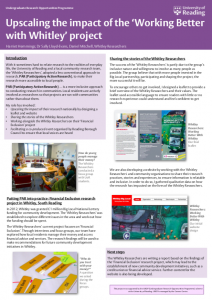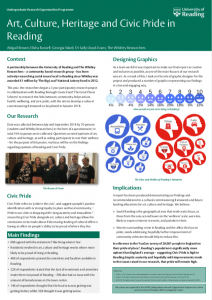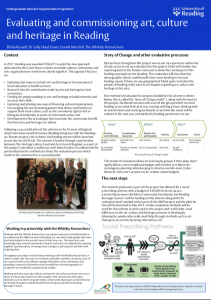Whitley Community Development Association (WCDA)
The Whitley Community Development Association is our key community partner and together we founded the Whitley Researchers collective. The story of how this collaboration began in 2014 with research into transport barriers can be read here. The programme now pays local residents a living wage as community researchers, with training provided through the University of Reading. Notable in what follows is how the project has been succeeded to build up trusted relationships, networks and contacts over time – connections which feed eachother and enable collaboration to flourish.
“This approach is rooted in urgent need and embedded in the everyday lives of those who are usually ‘done to’ in traditional research. Whitley Researchers work together with Reading Borough Councillors and community groups to identify critical issues facing local people, and use research to find practical answers.” The late John Ord, Whitley Researchers Community Manager
Since 2021, the Whitley Researchers and WCDA have been working on the University’s FoodSEqual project, co-producing healthy, sustainable food systems for disadvantaged communities.
Reading Voluntary Action (RVA)
We have collaborated with Reading Voluntary Action since 2014 on various projects including the Building Better Opportunities programme (aimed at coming alongside people furthest from work and helping them forwards). In 2019–2020, we supported their Youth Social Action Team to undertake peer-led research with over 500 young people about their experiences of growing up in Reading. This report was published in 2021. We also assisted as RVA explored the effect of lockdown on young people and what support structures might be put in place.
Food4Families
The Whitley Researchers have collaborated with Food for Families since 2017 on a number of research projects, looking into the effectiveness of their community gardening initiatives and sounding out potential improvements. Some of the reports we have helped with are available here. Key to the success of the gardens are their role in bringing the community together over a project in which individuals feel they belong and have some personal influence. Food4Families are a key partner in the FoodSEqual project.
John Madejski Academy (JMA)
JMA has been a key partner since 2017 and is the home of the Young Researchers prior to its expansion into other schools. The young people have been active in every stage of the research process, including the sharing their newly acquired knowledge and experiences with the wider community and even taking an interview from the BBC. With funding from Study Higher, the Young Researchers programme was expanded to a ‘Student Voice and Leadership’ team, bringing together Years 7–13 and engaging in new domains of research and investigation.
Most recently, Year 7 and 8 students have been participating in a herb growing project and looking at young people’s views on food, nutrition and sustainability as part of the FoodSEqual project.
Whitley for Real, 2017–2020
The Whitley for Real initiative was developed in 2017 by Reading Borough Council, the University of Reading and Whitley Researchers in partnership with schools, charities and stakeholders in the wider community. Its purpose was to co-produce local services and embed local voices in decision making.
The Young Whitley Researchers emerged during the course of this collaboration, beginning with a team of Year 9 children from the John Madejski Academy who explored how young people’s aspirations are affected by their wider environment. The findings from this research were published in 2018 in a highly publicised report, Aspiration in Whitley: improving the collaboration between schools, families and the community. The Young Researchers complement the work of the Whitley Researchers, but provide a voice for the younger generation in their own community. More on the development of the Young Researchers initiative can be read here.
“We are keen to collaborate even more with the University of Reading and the trail blazing work that Sally is involved with has encouraged us to deepen this relationship going forward.” Chris Bloomfield Neighbourhood Initiatives Manager, Reading Borough Council
Study Higher, 2017–2021
Study higher supported this initiative together with Whitley for Real, extending the youth aspiration research and enabling the production of ‘Aspiration Game’ kits for other schools and action groups. These game kits help to structure conversations with young people about their futures – more on the game here.
Study Higher funded an extension to the Young Researchers programme into several new schools, and helped us develop a Young Researchers Toolkit to share our methodologies. These projects were disrupted during the pandemic lockdown, but young people were engaged in collecting stories and images of the lockdown, and reflecting on how to move ahead in a changed world. We also worked with parents to understand their views on education and life-long learning, with a report due soon.
Reading Place of Culture, 2018–2021
The Great Place scheme was an initiative funded by the Heritage Lottery Fund and Arts Council England. Reading Borough Council won a Great Place award covering the period 2018-2021. The grant was directed at enhancing Reading’s cultural offer, helping to drive economic growth and improving the quality of life for people in Reading. Reading UK and the University of Reading are collaborating with Reading Borough Council in this project, with our research into local opinion helping to inform the development of new cultural initiatives and interventions.
Our major reports have focused on how various different social groups within Reading feel about art, culture and heritage (access the full report here), and also how art, culture and heritage contribute to wellbeing and belonging. We have also led evaluations for the Reading Thames Festival. We sought to provide a voice for the sectors of the population who are the least likely to find their way into existing art, culture and heritage initiatives; research which emphasised the importance of a co-development of cultural activities rather than simply asking people what they want and putting it on for them. Cultivating relationships with small local groups and enabling non-bureaucratic collaborations with them plays an important role in reaching the marginalised.
Reading Community Learning Centre (RCLC)
Reading Community Learning Centre provides support to some of the most socially isolated women in Reading, many of whom struggle with the English language. Partnering with this organisation, we brought together a research group of ethnic minority women to consider what barriers they and others face when integrating into British life. More information on this project and its findings here.
University of Reading
The University of Reading in its support for this project has assisted with funding of associated posts and student placements as the project has evolved.
The project is affiliated to the University of Reading’s Participation Lab, which is led by core members of the Human Geography Research Cluster and includes key partner organisations and practitioners as well as student representatives. The Participation Lab promotes the co-production of knowledge for social change.
The project is attracting interest in wider circles, with Dr Sally Lloyd-Evans being asked to speak at various conferences and academic institutions, as well as presenting to the Education Select Committee at Westminster. The attraction of this programme is the level of in-depth engagement, genuine co-production, and empowerment of local people of different generations to change things for themselves.
The project embodies the University of Reading’s role as a Civic University – one that is embedded in our local community, helping to raise education levels and encourage co-creation of solutions to local challenges whilst also improving the student experience through a stronger sense of connectedness to the community.This leads to the Undergraduate Research Opportunites Programme (below).
The Undergraduate Research Opportunities Programme (UROP)
The Undergraduate Research Opportunities Programme (UROP) within the University of Reading offers undergraduate students the chance to gain hands-on research experience on projects covering all disciplines across University. The Whitley Researchers and Dr Sally Lloyd-Evans began working with students through the scheme in 2014 and as of the summer of 2022 have worked with 18 students. The internships have resulted in multiple reports being produced in collaboration with the Whitley Researchers team, as well various opportunities to develop their interpersonal and research skills, many going on to focus their final year Dissertations around Whitley and the work of the Whitley Researchers.
Quotes from former UROP students who were engaged with this project:
“It was great to understand more about local communities that surround the University … especially considering most students remain in the tightly restricted bubble of campus and university culture … I developed myself and gained so much independence looking back.”
“Living in a bubble at university quickly becomes second nature and students can easily spend 3 years in a town or city without actually knowing the local community. However … we were welcomed into the local Whitley community with open arms. For a community that is nearly always looked upon negatively, we were astounded with how caring, open and warm the community was and it is their passion and determination that always comes to mind when I think of what a true community is.”
“If I had to describe the Researchers in one word, although a very tricky task, I think it would be “empowering” … It showed me (a quite a sheltered uni student) both the struggles a community could face, but also the power of a community, and how much of a force of change the Whitley Researchers can be – I definitely don’t know any other groups that successfully lobbied the council for new bus routes!”
“I now never forget the students who are from families earning under the average pay. The one thing that reverberated the most for me in my project, and always will, is that students in this category are the most susceptible to be overlooked and have increased issues with their education. I think that, if my journey has taught me anything, it is that every child matters, and I refuse to let a single child be overlooked any longer.”
“It has definitely encouraged me to think about those outside of my ‘bubble’ and made me think from a more inclusive perspective.”
As a part of the UROP scheme every student produces an academic poster summarising their experience and their findings to be presented at the UROP showcase, a selection of these can be seen below.
The internship role is advertised from February every year through the UROP website. You can register your interest here to sign up to the UROP mailing list and stay up to date with all the latest UROP information. Should you have any questions about the scheme, please contact the UROP Manager.




